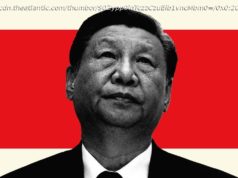Beijing’s gloating over America’s withdrawal masks a deeper anxiety.
As the United States rushed to evacuate people from an Afghanistan that is once again controlled by the Taliban, China has crowed over America’s failure in nearly every conceivable way. A former high-ranking member of the People’s Liberation Army has written a jubilant op-ed. State media have published scathing editorials. Chinese officials have circulated jingoistic tweets and nationalist cartoons. Although the platform has varied, the message has been largely the same: The U.S. ran away from Afghanistan in defeat, leaving its partners behind. The lesson? Taiwan—dwarfed in size by China, separated by only a narrow strait, and with few formal friends—should prepare for the same. Best to just give up now. Following China’s breakneck reengineering of Hong Kong, which has decimated many of that city’s unique freedoms, the questions about whether Taiwan (which Beijing regards as a renegade province, albeit one that the Communist Party has never actually controlled) will be next have multiplied. America’s retreat from Afghanistan has provided Beijing with an opportune moment to gloat, and to darkly remind Taiwan that even with a superpower on its side, it is still vulnerable. The story line has managed to take hold in the U.S. and Taiwan, forcing leaders in both places to defend the strength of their partnership. Yet the comparison between Taiwan and Afghanistan is a monumental stretch, and Beijing’s bluster may mask anxiety about what will come next in Afghanistan, and beyond. China has long-running concerns about Islamist militant groups—this is its pretense for its campaign of repression against the minority Uyghur Muslim population in the northwestern Chinese region of Xinjiang, which shares a short, rocky border with Afghanistan. The withdrawal could also finally free up the U.S. to pursue greater engagement and investment in Southeast Asia and the Indo-Pacific, setting up a larger challenge to Beijing. “There is no comparison,” Joanne Chang, an expert in U.S.-Taiwan-China relations at the Taiwanese-government-linked research institute Academia Sinica, told me. “Compare Afghanistan to Taiwan? I think it is wishful thinking from the Chinese side.” Taiwan—formally known as the Republic of China—exists on the international stage in a sort of diplomatic purgatory, unwelcome at the United Nations, competing under an alternate flag and name at the Olympic Games, and recognized by just a handful of countries. The U.S., for its part, maintains a relationship of “strategic ambiguity” with Taiwan. Beijing has amped up its rhetoric and intimidation tactics against Taiwan in recent years, flying dozens of warplanes over the Taiwan Strait and conducting military drills near the island. The U.S., meanwhile, has continued its arms sales to the Taiwanese military and sent a number of formal and informal delegations to the island in recent years. And though American voters have long supported a withdrawal from Afghanistan, a Chicago Council for Global Affairs survey published in August found that for the first time, half of Americans favored using U.S. troops to defend Taiwan if China were to invade. “Taiwan is just a fundamentally different issue for the United States,” Kharis Templeman, a research fellow at Stanford University’s Hoover Institution, told me. Afghanistan was a “pretty marginal place strategically,” he said. “Taiwan, on the other hand—there is a much longer history there. We have a much deeper economic and political engagement with Taiwan.” Templeman pointed to these long-term relations in rejecting the comparison, as well as to fundamental differences between Taiwan and Afghanistan. “What Biden does or doesn’t do in Afghanistan doesn’t tell the Chinese anything about what he would or wouldn’t do in the Taiwan Strait,” Templeman told me.






